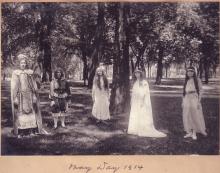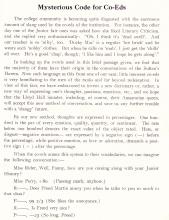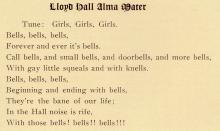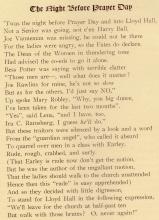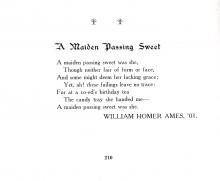The Y. W. C. A. Entertains
The 1911 Microcosm includes a piece on the success of the Y. W. C. A.'s night of entertainment for the college. The show included two dramatic acts, one entitled, "The Costs of Independence or an Old Maid's Regrets" and the other called, "Beautiful Belinda or Why Girls Leave Home." One of the more successful parts of the night though was not on stage, according to the men, but more so in their bellies. Candy that the girls had made was sold between acts and the men bought it because "it was made by her own little hands."
"A Fear That Suffragettes Might Develop Amongst Us"
In the senior class history in the 1911 Microcosm, there is a short paragraph written on the fear amongst the college that their women would turn into suffragettes. From this fear, the college held a meeting only for the females about their decision. A joint meeting was then held and "negotiations [were] entered into, and a treaty formed."
?, A "Questionable" Show
The 1910 Microcosm comments upon the show that the women of the college were to put on. All of the advertisements, tickets, etc., were punctuated with question marks, leaving the theme of the show open to much speculation by its audience. The program declared that the entertainment was to be presented by the Y.W.C.A., which some men thought it meant "Young Women Can't Act" but were made to think differently. The first act was a comedic piece titled "Mrs. Oakley's Telephone" about the many conversations between various characters that takes place on this one telephone.
Lloyd Hall Alma Mater
The 1910 Microcosm publishes this song titled the "Lloyd Hall Alma Mater" for the ladies who reside in the women's dormitory. The song's main theme is about bells and how they are found in all aspects of women's lives. From calling bells to door bells to wedding church bells, their life is "beginning and ending with bells."
"Twas the Night Before Prayer Day" and Not a Lady Could Be Found...
"The Night Before Prayer Day" is a humorous poem about the women's decision not to have male escorts to the Prayer Day event, causing quite an uproar on campus. In support of the Women's Suffrage Movement, the co-eds of the class of 1910 decided to escort themselves to Prayer Day, which is scandalous to not be escorted to the church by a male. The male students were trying to force the women to be escorted by them, but instead the women declared that, "We'll leave for the church at half-past ten, but walk with those brutes? O, never again!"
Now She's A Young Suffragette!
"Lest We Forget, the Suffragette" is a satirical piece written for the Microcosm about the Women's Suffrage Movement. The piece begins with all of the women are trying to decide which man they will use as an escort for Prayer Day. After much deliberation and defeat, the women then resolve to go to the Prayer Day event together, leaving the men to go alone.
Lucretia McAnney, Dean of Women and Instructor in Oratory since 1906
The 1910 Microcosm writes up a short paragraph about Mrs. Lucretia Jones McAnney, the Dean of Women and Instructor in Oratory since 1906. Since 1882, Mrs. McAnney has been teaching and studying at schools until she became the Dean of Students in 1906. She would stay the Dean of Women until 1914.

